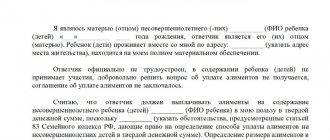9
Many single parents with a light heart send their children who have graduated from school to expensive university education after reaching the age of 18, relying on alimony assistance from their ex-spouse. Alas, only a few parents take part in supporting the child after reaching adulthood and while studying in educational institutions of secondary and higher vocational education. Decent assistance in the form of alimony while the child is studying remains hope for the best.
Are such hopes justified? Do parents pay child support after 18 years of age and is it possible to recover funds from a student?
Do I need to pay child support after 18 years of age?
When children reach the age of majority, parents are released from the obligation to pay the amount of funds for the maintenance of a minor child. Material support in the future is provided only with the consent of the former alimony payer.
Important! Maintenance of a child after 18 years of age is provided exclusively on a voluntary basis. No one has the right to force or otherwise oblige a parent to pay child support after 18 years of age.
This point of view of the legislator is set out in the following norms of the Family Code.
- In Art. 80 of the RF IC contains a provision obliging parents to participate in providing for their children until they turn 18 years old.
- According to Art. 120 of the RF IC, the termination of payments occurs when the child reaches the age of majority or when he acquires full legal capacity in the manner of emancipation.
Thus, it is impossible to recover alimony payments from a minor if the guardianship and trusteeship authorities have recognized him as fully capable before reaching 18 years of age. This is permissible in cases where a child gets married, gets a job, or registers as an individual entrepreneur. There are also no ways to extend child support after 18 years of age due to need for money or tuition fees.
Legal assistance
Courts closely evaluate the property status of adult needy children and their parents. The winning rate in such cases is not very high. As a rule, disputes involving competent lawyers end in success. An independent demand for child support for adults is fraught with losing the case. The plaintiff needs to collect impressive evidence, select a sample claim and state his claims from the point of view of the law. Is this possible without legal skills? Definitely not!
A free online consultation with lawyers on our portal will help you understand the situation. Having described your problem, you can count on a comprehensive analysis of the case. Lawyers will give recommendations on what to do when collecting alimony for children after 18 years of age. Specialists also offer services for drawing up a statement of claim, collecting documents, appealing the actions of opponents and interacting with bailiffs. Contact us, we are ready to help at any time of the day or night!
Watch the video about whether you need to pay child support after 18 years of age, including for a university student:
Attention!
- Due to frequent changes in legislation, information sometimes becomes outdated faster than we can update it on the website.
- All cases are very individual and depend on many factors. Basic information does not guarantee a solution to your specific problems.
That's why FREE expert consultants work for you around the clock!
- via the form (below), or via online chat
- Call the hotline:
- Moscow and the Region
- St. Petersburg and region
- FREE for a lawyer!
By submitting data you agree to the Consent to PD Processing, PD Processing Policy and User Agreement.
Anonymously
Information about you will not be disclosed
Fast
Fill out the form and a lawyer will contact you within 5 minutes
Tell your friends
Rate ( 11 ratings, average: 4.27 out of 5)
Author of the article
Irina Garmash
Family law consultant.
Author's rating
Articles written
612
Is it possible to collect alimony after 18 years of age by law?
As a general rule, no. But under a number of circumstances this is possible:
- When it comes to collecting alimony for the past period, but no more than 3 years. In this case, of course, we cannot talk about alimony for adults, but for some time the alimony debt will be paid for the period of the recipient’s minority, but after adulthood inclusive. In essence, the plaintiff is demanding funds due to him by law that were not previously received.
- When money is needed to support an adult disabled child who needs additional help and care in accordance with Art. 85 RF IC.
Attention! The only possible option to receive funds for an adult child is to prove his disability and need for help.
What to do with debt?
After 18 years of age, it is also possible to collect arrears of alimony. As in cases concerning other categories of payment recipients, in accordance with Art. 113 of the RF IC, this is done within three years that preceded the moment of presentation of the writ of execution or agreement for collection.
Note! There is an exception to the three-year limitation period rule. It consists in the fact that if the failure to fulfill obligations was due to the fault of the alimony provider, the debt is taken over the entire period of non-payment.
The amount of debt that remains after 18 years is determined by the bailiff, based on the amount of alimony obligations established either judicially or voluntarily. In the case of alimony for adult children, it is calculated in a fixed amount, based on the cost of living during the delay. If any of the parties disagrees with the calculation of the debt made by the bailiff, it has the right to appeal his actions in accordance with Art. 441 Code of Civil Procedure of the Russian Federation.
Since the inflation process can turn the amount of accumulated alimony debt after 18 years into a very small amount, the legislator allows the indexation mechanism to be extended to its collection. In accordance with Art. 102 of the RF IC, it is made in proportion to the increase in the cost of living. The bailiff issues a ruling on this. The calculation is based on the amount of obligations established in a court decision or agreement of the parties.
In order to claim a debt, you must write a statement to the bailiff. In it, in accordance with Art. 30 of the Law “On Enforcement Proceedings” No. 229-FZ of October 2, 2007, you must indicate:
- Name and address of the FSSP body.
- Passport details, full name, date of birth of the claimant.
- Similar details of the alimony payer.
- Details of the writ of execution (agreement, writ of execution).
- Please calculate the debt taking into account indexation.
- Information about the income and property of the alimony debtor, his place of work.
- Proposal to send requests to the Pension Fund, the Federal Tax Service, the State Traffic Inspectorate, banks - if the information specified in clause 6 is insufficient.
- Description of applications.
- Date, signature.
The application can be submitted in person, sent by mail, or sent through a representative. If the bailiff does not take the necessary actions, you should write a written complaint against him to a superior person or to the court.
Payment terms
According to Art. 85 of the RF IC, adult children have the right to receive payments if two conditions are simultaneously met - need for funds and incapacity for work:
- Those in need are those citizens who are unable to independently ensure a normal existence for themselves, and the government payments and benefits they receive are not enough. Whether a person requires additional assistance in the form of alimony is decided by the court based on the specific circumstances of the case.
- Disabled citizens are those recognized as such based on the results of a medical and social examination and assigned the appropriate disability group.
Important! Two conditions must be met at once. The usual need for assistance in the presence of a child’s ability to work or disability in the presence of obvious well-being due to any other sources of income prevents the collection of alimony from the parents.
The main controversial point in such cases is the child’s need for money. Thus, judges pay attention to the amount of necessary expenses for its maintenance, the amount of income of the plaintiff, and the presence of objections from the defendant regarding the need for assistance. If the father or mother cannot justify the fact that the child has enough money, they are unlikely to have a chance to evade child support.
What should be contained in the statement of claim
In the claim, in accordance with Art. 131 of the Code of Civil Procedure of the Russian Federation, the following points must be contained:
- The name of the court where the claim is filed.
- Plaintiff's details: full name, registration address, telephone, email.
- Details of the representative (if any).
- The same data regarding the defendant.
- Statement of the essence of the problem, which is the violation of rights.
- The circumstances on which the requirements are based.
- The amount of alimony payments claimed by the plaintiff.
In accordance with the specific situation, on the basis of Art. 132 of the Code of Civil Procedure of the Russian Federation, the following are attached to the claim:
- child's birth certificate confirming relationship;
- marriage (divorce) certificate of parents;
- certificate of disability;
- documents confirming the plaintiff’s income and expenses that must be provided;
- documents indicating the amount of income of the defendant (if any);
- a copy of the claim according to the number of persons participating in the case;
- power of attorney for a representative, confirmed by a notary.
Amount of alimony
When establishing alimony in accordance with Art. 85 of the RF IC for adult children, the amount of monthly monetary maintenance is established by the court in a fixed amount - a multiple of the subsistence minimum for the corresponding category of citizens (for example, 2 monthly wages, 0.5 monthly wages, etc. - this is done for indexation).
Each region has its own cost of living, and if it is not determined, then deductions are calculated based on indicators for Russia.
The specific cost of living coefficient is selected based on the financial situation of the payer, the presence of dependents and other important circumstances of the case.
Important points of claims
When filing a claim, you need to pay special attention to the following:
- It is necessary to provide a convincing justification for the need to collect alimony. This is especially true for evaluative characteristics such as need.
Here it would be advisable for the plaintiff to describe in detail what income he has (for example, a disability pension) and correlate it with urgent needs for which the funds received are not enough (purchase of medicines, payment for housing and communal services, other necessary payments).
- It is necessary to properly approach the issue of collecting evidence. To do this, you will need to collect prescriptions, bills for the services of a nurse, a rehabilitation clinic, and receipts for medications.
- When indicating the amount of the claim, you should proceed from the real state of affairs, taking into account not only your needs, but also the capabilities of the obligated person - financial and family (amount of income, state of health, presence of dependents). The court always takes them into account when calculating payments.
Collection of alimony for the maintenance of an adult child
If the father or mother does not voluntarily help support a disabled child after 18 years of age, alimony is collected through the court.
The initiator of the dispute can be the child himself if he has full legal capacity, and in the case of his incapacity (limited legal capacity) - a guardian (trustee) in the person of the second parent or another plaintiff authorized by law.
If alimony has already been established previously (before the child reaches 18 years of age), the claim will need to be filed again, since the subject matter in this case changes:
- child support for children under 18 years of age is subject to termination;
- Child support for an adult child is established in a different amount based on changed circumstances.
Statement of claim (sample)
A claim for the recovery of alimony for adult children is filed according to the same rules as a standard claim for the recovery of alimony. The claim is drawn up taking into account the requirements set forth in Art. 131-132 of the Code of Civil Procedure of the Russian Federation and is subject to submission to the magistrate’s court at the defendant’s place of residence.
The rule of jurisdiction at the choice of the plaintiff in the case of an adult child is no longer valid, therefore the application falls within the exclusive competence of the magistrate’s court at the place of official residence of the defendant.
The claim states:
- full name of the judicial authority and its address;
- Full name of the plaintiff and defendant, their registration addresses and actual location;
- circumstances of the case: date of birth of the child, date of majority, grounds for receiving alimony after 18 years;
- justification for the amount of alimony, arguments against the defendant and his evasion of paying money in favor of the child;
- request for the collection of alimony in a fixed amount;
- signature of the plaintiff, date of filing the claim and list of attachments.
The claim is filed both in person at the court reception desk and by mail. There is also the possibility of filing a claim electronically, but this requires a qualified electronic signature or a personal account on the State Services website.
The presented sample reflects only one of the possible situations when there is a need and possibility of collecting alimony for an adult child.
To draw up a competent statement of claim, contact an experienced lawyer or for a free consultation with the specialists of our website.
Documentation
The following must be attached to the application:
- a copy of the plaintiff's passport;
- birth certificate of a disabled citizen;
- an extract from the house register;
- ITU certificate;
- documents evidencing expenses and income;
- a copy of the court act declaring the child incompetent (partially capable);
- a document confirming the powers of the guardian (trustee);
- a copy of the claim and package of documents for the defendant;
- receipt of payment of duty.
If the claim is filed by a lawyer, he must confirm his authority with a power of attorney, a copy of which is attached to the claim, and the original is presented when filing the claim or when visiting the court.
Limitation of actions
The moment the claim is filed does not matter. As long as the child is recognized as disabled and needs money, he has the right to alimony.
Important! It will not be possible to collect alimony for the previous three years in relation to an adult child, since the RF IC establishes this possibility only for minor children.
State duty
The amount of the state duty is 150 rubles, but if, when filing a claim for alimony in favor of minor children, it is not the plaintiff, but the defendant who pays it (clause 14, clause 1, article 333.19, clause 2, clause 1, article 333.36 of the Tax Code of the Russian Federation), then In case of recovery of maintenance for children over 18 years of age, this benefit does not apply.
The fact of payment of the fee is confirmed by a receipt, which must be attached in the original to the statement of claim.
Disability
Disability occurs when a person is unable to work and earn money due to old age or poor health.
We are not interested in old age. It is unlikely that a sixty-year-old pensioner will have parents who can provide for him at that age.
Incapacity for work for health reasons is confirmed by a medical and social examination, based on the results of which the citizen is assigned a disability of 1, 2 or 3 groups, or by a court decision.
It must be taken into account that disabled people of the third group are often not deprived of their ability to work and, due to health reasons, are able to carry out work activities, so they are unlikely to be able to collect child support from their parents.
Adult able-bodied children who are studying at a higher educational institution do not have the right to child support.
A special issue is whether it is possible to collect alimony for education after 18 years of age. There is a lot of controversy among lawyers about this. There is no regulation that clearly states that a parent must pay child support until the child graduates from an educational institution, even if he has already reached the age of majority. But the Family Code of the Russian Federation states that alimony for adults is paid subject to their recognition as incapacitated.
Some lawyers classify full-time students in this category, explaining that they are not able to carry out work activities, since they devote most of the day to studying. In addition, they do not have any special education, which is also an obstacle to their employment.
The courts also have an ambivalent attitude towards making decisions on the appointment of such alimony: some issue orders for their collection, and some refuse to receive them. In parallel, they study other aspects: the financial situation of both parties, the order of training, the availability of scholarships, etc., which influences the final decision.
Procedure for payment and withholding of alimony
A court decision that has entered into legal force is the unconditional basis for monthly deductions of child support by the parent obligated to pay it.
He chooses the payment method independently. This could be sending them money yourself or instructing the employer’s accounting department to withhold the necessary amounts.
If the payer does not work, he himself transfers or transfers funds in a way that allows recording the fact of their transfer to the child:
- postal transfer;
- payment to a card indicating the purpose of payment;
- transfer to a current account;
- transfer of money in cash with a receipt.
In case of non-receipt of alimony, the mother of a disabled child, the child himself or his guardian must contact the FSSP with a writ of execution and an application.
Based on these documents, the bailiff initiates proceedings and, if necessary, takes measures to forcibly withhold alimony.
Thus, he has the right to oblige the employer to send money to the child, to seize the man’s property or his bank accounts, and to take other measures provided for by Law No. 127-FZ. A penalty is charged for the amount of alimony not paid on time.
Important! Responsibility for non-payment of alimony, provided for in Art. 5.35.1 Code of Administrative Offenses of the Russian Federation and Art. 157 of the Criminal Code of the Russian Federation also applies to cases of evasion of child support by parents for adult children.
Arbitrage practice
The Review of Judicial Practice of the Presidium of the Supreme Court of the Russian Federation dated May 13, 2015 indicates that cases of collection of alimony for disabled children are considered quite rarely, but most of them have a positive outcome for the plaintiffs.
Examples may be decision No. 2-79-1260/2011 dated October 12, 2011 of the Sovetsky District Court of Bryansk, court order No. 2-1052/2014 dated May 28, 2014 of the magistrate judge of court district No. 5 in the city of Kursk
In practice, attempts are often made to sue able-bodied adult student children. It is worth saying that sometimes it is not without success, especially if there is an incorrect interpretation of the law. But, of course, when cases are reviewed by higher courts, decisions that contradict Articles 80 and 120 of the RF IC are cancelled.
An example of one such case is given in the Review of Judicial Practice, when the judge erroneously applied the provision of the Law “On Labor Pensions”, which stated that a child is recognized as disabled until the age of 23, and collected alimony for his maintenance. The appellate court overturned this decision.
Child support for adult children studying at a university
There is an opinion that children should receive child support even after their eighteenth birthday. This point of view is wrong.
The misconception is caused by the fact that for a long period of time the State Duma was considering bill No. 876581-6, which provided for the possibility of receiving alimony for students under 24 years of age. Back in 2021, this project was withdrawn from consideration.
In addition, in neighboring Ukraine, the legislation contains a provision that full-time students must receive financial assistance until the age of 23.
Another reason for such misconceptions: an erroneous analogy with a survivor’s pension or court-ordered maintenance due to culpable harm to a minor’s breadwinner. These payments can be established up to the age of 23, subject to full-time study at a university.
Important! In Russia, it is impossible to collect alimony payments for an able-bodied and capable child student over 18 years of age.
Until what age do they pay if the child is studying?
Child support must be paid until the child's eighteenth birthday, regardless of whether the child is studying or not.
After reaching this age, no one can force the father to make contributions. Another thing is an agreement between parents, in which the parties determine the end of monetary obligations, the amount and procedure for payments.
The status of such an agreement is questionable, since a notary will not certify an agreement on the payment of alimony for a child after 18 years of age, and under a non-notarized agreement, it will be impossible to force a parent to pay any funds.
Collection of child support for a student child
You can forcefully collect money from a student only if he is disabled and needs money. At the same time, truly disabled and needy adult children rarely have the physical opportunity to undergo education.
Important! If a student child suddenly becomes seriously ill or is injured, which subsequently results in disability or loss of ability to work, then the provisions of Art. 85 of the RF IC and a child, regardless of age, will have the right to maintenance from his able-bodied parents.
New in the law on financial support for children
“Adult children” is a very trivial concept. Parents themselves, at their own discretion, can support their child even until his retirement, but this does not mean that this is encouraged by law.
In 2021, only one amendment was made to the Family Code regarding alimony payments. It applies to children studying in government institutions.
A child who is in an orphanage, but has living parents, including those deprived of parental rights, receives maintenance from them. However, now alimony (50% of the amount) will be credited to his personal account. For the reluctance to pay them, measures have been taken to tighten liability.
Projects that have been discussed in the Duma for a long time have not been adopted.
These include:
- extension of child support payments from a parent until the child reaches 23 years of age, including for full-time studies at a university or vocational school;
- payments for children who have reached the age of 18 but have not completed secondary school.
It was envisaged that the amount would be fixed based on how much the student needed for clothes, shoes, stationery, and food. However, the majority of deputies did not support the innovation, believing that an adult should not “sit on their parents’ necks.”








